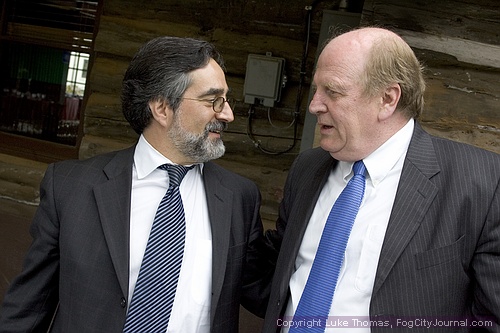Recall Reforms

Supervisors Aaron Peskin and Jake McGoldrick are the subject
of politically motivated recalls.
Photo(s) by
Luke Thomas
By Joe
Lynn
June 14, 2007
In the old days, they carted off nobles they didn't like to molder
in dungeons and towers. Then they could appoint more loyal fiefs
in their place.
Here in modern San Francisco, they get a recall going. Then the
mayor can appoint more loyal supervisors in their place.
The system we use is more medieval than democratic! Until now,
there have been no fewer than five recall efforts during the Newsom
administration. McGoldrick
and Peskin have groups that have filed with the Department of
Elections. Ed Jew has a six month period of immunity from recall,
but recall is rushing along with the potential charges of official
misconduct. Mayor Newsom’s campaign site has a pledge
by a supporter to recall Supervisor Daly. Some others have
talked of recalling Mayor Newsom. That adds up to five recall
campaigns.
I support the theory that the people are sovereign. I support
the power of the people to recall any elected officer. They should
be able to recall their elected leaders for any reason. Thus there
is no requirement that malfeasance be involved in a recall. As
a practical matter though, the sovereignty of the people stands
in direct contrast to the political power we allow to concentrations
of money. In other elections, we turn to campaign finance regulations
for our protections. Yet we have allowed recalls to go unregulated.
In addition, recalls involve other assaults on the principle
of popular sovereignty. Successful recalls may supplant a recalled
officer with a candidate less acceptable to the people. For example,
an elected official might not command the 50% majority needed
to withstand a recall, yet still be elected if allowed to stand
in the election for the successor. In San Francisco, we give the
extraordinary power to appoint a successor to the Mayor unlike
the State system that gives it to popular vote.
Here are some ideas to consider to reform our laws:
Establish contribution limits. Since the recall is not
a candidate election, it becomes a ballot measure. Ballot measures
are not subject to contribution limits because money given to
ballot measures normally does not normally benefit any candidate
or elected official. Obviously, that line of reasoning is not
applicable to a recall measure where contributions are tied directly
to the fate of the folks vying for the office. We need to conform
the contribution limits of recall measures to those we associate
with elections of City Officers. Thus, we would cap the contributions
at $500 and include the other prohibitions as well (no corporate
contributions, aggregating affiliated entity contributions, etc).
This single reform should be passed on an emergency basis.
Provide public financing. We should make public financing
available to parties involved in the recall who are willing to
limit their spending. The same arguments in favor of candidate
public financing apply.
Elect the successor. Right now, the Mayor appoints the
successor to a recalled office. This flies in the face of the
principle that the people should choose. It also gives the Mayor
a strong incentive to support recalls since he/she will be given
a chance to appoint a crony to the office, thereby increasing
the political power of the Mayor. Stories already hint that the
Mayor is involved in the McGoldrick recall as folks have noted
the links
to the involvement of the political consultants of Google and
Earthlink.
By providing for elections of the successors, we remove the Mayor’s
office from undue suspicion. In any event, the people should decide
the successor as they do at the State level
Allow the recalled candidate to run for election. If an
officer is recalled, that person may still be the choice of the
majority of voters to serve in the office! For example, Gavin
Newsom might be successfully recalled by a majority of voters
wanting someone else, yet he would win a Ranked Choice Voting
contest because no candidate would surface more popular than him.
If that is the case, allowing him to win office in the election
accompanying the recall honors the principle of popular sovereignty.
Identify paid signature gatherers. We should take the
lead from the City of Santa Monica and require those who are paid
to gather signatures for any ballot measure to identify themselves.
Otherwise, the public can be misled into thinking that a groundswell
of public support is indicated by an army of paid signature gatherers.
This proposal is in line with traditional campaign finance disclosure
laws that require committee information to be posted on flyers,
signs and mailers. In this case, the disclosure is carried by
an individual rather than the advertisement.
Joe Lynn was the campaign finance officer and office manager
of the San Francisco Ethics Commission from 1998 to 2003. From
2003 to 2006, he served as one of the five Ethics Commissioners.
The San Francisco Examiner called him “the backbone of the
Ethics Commission.” While on staff, he was named SF Government
Employee of the Year by the SF Weekly in 2003. Mayor Willie Brown
gave him two awards for his mentorship work He also received two
commendations from the Board of Supervisors, one initiated by
then-Supervisor Gavin Newsom and the other by then-Board President
Matt Gonzalez. The Northern California Society of Professional
Journalists presented him the James Madison Freedom of Information
Award in 2003. He managed the City’s electronic campaign
finance program (named best in the country by the Center for Governmental
Studies) and the conflict of interest program (named best in the
state by the Montclarion). He maintains an active interest in
good government laws. Email Joe at joelynn114@hotmail.com

####
Editor's Note: Views expressed by columnists
published on FogCityJournal.com are not necessarily the views or beliefs of
Fog City Journal. Fog City Journal supports free speech in all its varied forms
and provides a forum for a complete spectrum of viewpoints.
|